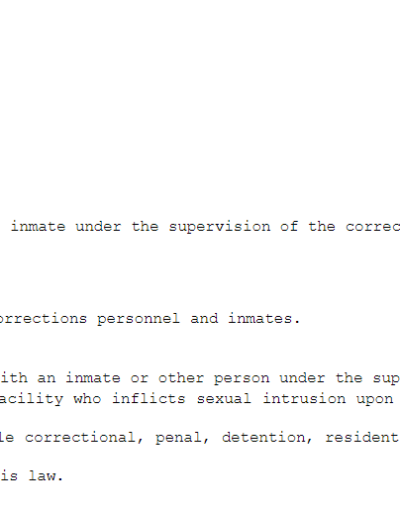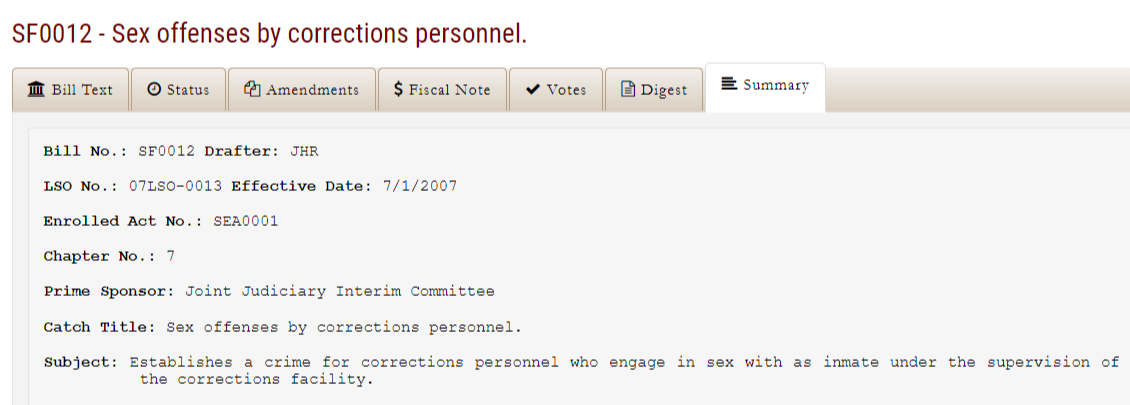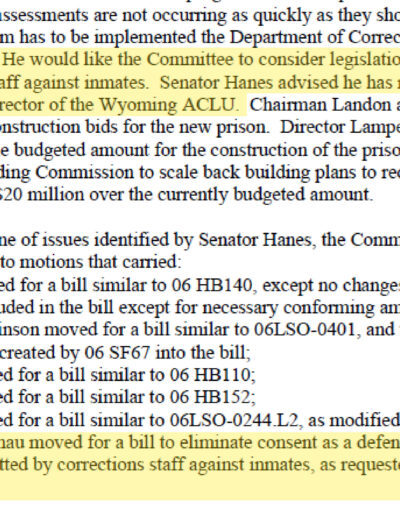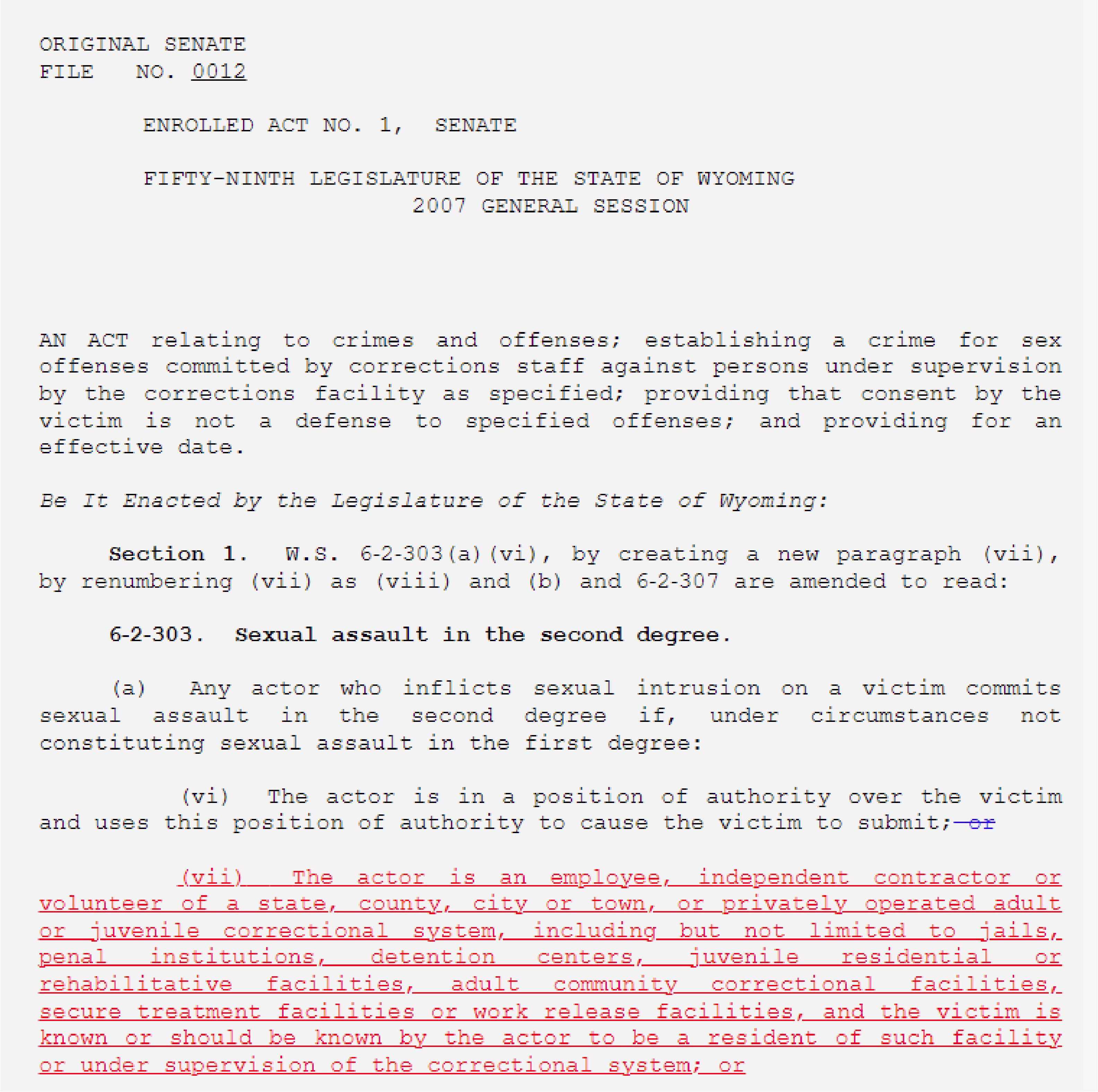SEXUAL MISCONDUCT STATUTE
THE PROBLEM
W.S. 6-2-303(a)(vii) states:
(vii) The actor is an employee, independent contractor or volunteer of a state, county, city or town, or privately operated adult or juvenile correctional system, including but not limited to jails, penal institutions, detention centers, juvenile residential or rehabilitative facilities, adult community correctional facilities, secure treatment facilities or work release facilities, and the victim is known or should be known by the actor to be a resident of such facility or under supervision of the correctional system
This behavior is currently criminalized within the 2nd Degree Sexual Assault statute. All other second degree offenses are violent and non-consensual. Sexual misconduct is consensul, non-violent and should be categorized differently.
There is no consideration to whether the actor had any power or control over the victim. In fact, the offense gives no consideration to the intent or state of mind of the actor. It is for this exact reason the offense cannot be seen as violent or non-consensual. This is a textbook example of a statutory rape offense.
How written, this legislation assumes that volunteers have the same power or authority that a prison guard has
The language is vague, conflicting, and open to interpretation. It does not clearly state the legislation applies to individuals in a non-confinement setting outside of institutions. Despite this, the interpretation of the statute has been expanded to include probation settings within the community.
The legislation assumes individuals on probation must be protected from individuals who have power or the ability to impact their rights and freedoms. However, the law is only applied to representatives of the Department of Corrections and not judges, attorneys, law enforcement, or mental health providers.
When this law is used in situations with victims who are not in custody, there is a false presumption the actor is misusing their authority or targeting the victim. While this can be true in some instances, the law also criminalizes innocent behavior in which there was no ill intent by the actor.
THE SOLUTION
Repeal W.S. 6-2-303(a)(vii) and replace with a new Sexual Misconduct statute
Limit the crime to those who have power or control over the victim
Expand applicability to anyone in the criminal justice system with power over the victim
PROPOSED LEGISLATION
1st Degree Sexual Misconduct
(a) Any actor who inflicts sexual intrusion on a victim commits sexual misconduct in the 1st degree if:
(i) The actor is an employee or independent contractor of a government or privately operated adult or juvenile correctional facility, including but not limited to jails, penal institutions, detention centers, juvenile residential or rehabilitative facilities, adult community correctional facilities or secure treatment facilities and the victim is known or should be known by the actor to be a resident of such facility.
(ii) The actor is a peace officer as defined by W.S. 6‑1‑104(a)(vi) or 7‑2‑101(a)(iv) and the victim is under arrest, being detained or is otherwise in the actual custody of law enforcement and the actor:
(A) Is responsible for effecting the arrest of the victim, detaining the victim, or maintaining the victim in actual custody; or
(B) Knows, or reasonably should know, that the victim is under arrest, being detained or is in actual custody.
1st Degree Sexual Misconduct is a felony punishable by imprisonment for not more than ten (10) years and is NOT a registerable sex offense.
2nd Degree Sexual Misconduct
(a) An actor commits sexual misconduct in the 2nd degree when he or she knowingly commits sexual intrusion, and:
(i) The actor is an employee or contractor of the criminal justice system who has direct supervisory and disciplinary authority over the victim, including but not limited the sentencing judge, prosecuting attorney, supervising probation officer or any certified peace officer and the victim has been ordered to participate in any form of community supervision, probation, parole, in a pretrial release or pretrial diversion or treatment program or in any other status involving a state-imposed restriction on liberty.
2nd Degree Sexual Misconduct is a felony punishable by imprisonment for not more than five (5) years and is NOT a registerable sex offense.
ANALYSIS
There are several problems currently with W.S. 6-2-303(a)(vii) that require significant change. The purpose of this legislation is to criminalize the act of consensual sex between adult public servants and those involved in the criminal justice system. This behavior is inappropriate because of the power differential that exists between the two parties.
W.S. 6-2-303(a)(vii) was devised after a jail detention officer was acquitted after being charged with intercourse with an inmate. I believe that guard had been charged with W.S. 6-2-303(a)(vi), however he was able to use consent as a defense.
Therefore, this new offense was created to criminalize the act of consensual sex between guards and inmates. Inexplicably, this new offense was added to the Sexual Assault in the 2nd Degree statute. Every other offense in this statute includes what are clearly non-consensual acts. Because the offense does not require any malice on the part of the actor, it is completely inappropriate for this to be a 2nd Degree Sexual Assault offense.
W.S. 6-2-303(a)(vi) states “The actor is in a position of authority over the victim and uses this position of authority to cause the victim to submit.” This offense would be used against a correctional employee who coerced an inmate into a sexual encounter by misusing his power and authority. This is obviously a serious offense and is appropriately classified in keeping with the other offenses comprising a 2nd Degree Sexual Assault.
“This means that a janitor who contracts with the Department of Corrections to clean a field office in the evening can be sent to prison for having sex with a person on probation. The law does not require the janitor to have done anything wrong and does not require that janitor to have any power or authority. This is obviously outrageous and a completely unintended consequence of the law because of its use in a probation setting.”
W.S. 6-2-303(a)(vii) was intended to close the consent loophole. It is a lesser crime. Its entire purpose is to hold a correctional officer accountable when there is no evidence showing the act was not consensual. It requires no violence, force, fear, coercion, or manipulation. The statute does not even require the actor to be in any position of authority, let alone misuse that authority. It is clearly a lesser offense than W.S. 6-2-303(a)(vi) and the bar to prove the offense is significantly lower and easier. Hence, it has absolutely no business classified as a violent 2nd Degree Sexual Assault with a mandatory minimum prison sentence and lifetime on the sex offender registry.
The interpretation to apply this statute to a probation and parole setting in the community is even more problematic. Inmates are incarcerated and have had their liberties stripped. The government is in complete control over the inmate’s body, their freedoms and everything they do. Inmates physically cannot leave and are at the complete mercy of the government.
Individuals on probation have most of their freedoms intact and have control over their bodies. Probationers can consent and enter relationships freely. While both inmates and probationers are under the supervision of the criminal justice system, there are significant and obvious differences between the two populations.
To be clear, no one representing the judicial system or probation should be having sexual relations with someone on probation. It is highly inappropriate and the employee or representative should be fired. However, should they be sentenced to prison? A lifetime on a sex offender registry?
If someone on probation must be protected because the government has some control over them and can further limit their liberties, several issues come into play. Who are all the groups of people who have substantial amounts of power over an individual on probation? Should the actor have direct authority over the probationer? As it stands, any correctional employee, contractor, or volunteer, regardless of the presence of any power or authority can be charged with this crime.
This means that a janitor who contracts with the Department of Corrections to clean a field office in the evening can be sent to prison for having sex with a person on probation. The law does not require the janitor to have done anything wrong and does not require that janitor to have any power or authority. This is obviously outrageous and a completely unintended consequence of the law because of its use in a probation setting.
Meanwhile, the sentencing judge, a police officer, or the prosecuting attorney who all have more power than a probation officer can have sex with a person on probation with zero criminal liability. This is unacceptable.
If someone on probation needs to be protected from having a consensual relationship with anyone involved in the criminal justice system, we need to take a hard look at how to apply this concept in an equal and just manner. In addition, these restrictions should be applied to criminal justice representatives who have supervisory authority and the ability to misuse their power.
There is another elephant in the room. The same consent loophole exists with the law enforcement community. A police officer can legally engage in sexual intercourse with a person who is in custody or detained. Clearly this is not appropriate. Legislation proposed to close this loophole was introduced last session but never considered.
There are many nuances and levels to this type of crime. Different people have various levels of vulnerabilities and different actors have various levels of power. If I were to categorize the seriousness of these types of offenses, starting with the most serious, it might look like the decision ladder on this page which ranks actions from most to least serious.
These are all different situations. There needs to be conversation and debate on how far reaching the legislature wants this law to be. Should such a law be narrowly tailored to capture conduct in which someone with power was trying to use or take advantage of someone with less power? Or should the statute to be so broad that it captures and punishes people involved in innocent conduct with no harm to the victim?
It is clear this legislation is vague, open to interpretation, has unintended consequences, is wrongly classified and highly questionable. There should be no doubt on how to apply this law and it should do so equitably and logically. The Wyoming State Legislature has an obligation and responsibility to carefully reexamine this statute and fix what is broken.
Statutory rape offenses involving consensual sexual acts with juveniles have their own separate statutes outside of the 1st through 2nd Sexual Assault statutes. Statutory rape crimes have many nuances due to different ages, age gaps, and amounts of power by the actor. Other consensual acts regulated by the government such as Incest or Soliciting a Prostitute have their own separate statutes. Because the acts in question criminalize consensual sex, they should not be intertwined with other sexual assault statutes that include clearly non-consensual acts.
The federal government also believes there is a clear line between individuals in custody and those on probation. It does not recommend or require consensual acts between an actor and individual on probation to be a registered sex offense:
SORNA section 111(5)(C) addresses the minimum standards for requiring sex offender registration for consensual sexual conduct under the Adam Walsh Act. SORNA does not require registration in the following situations: 1) If both participants are adults, and neither is under the custodial authority of the other (e.g., inmate/prison guard) and the conduct was consensual, then this conduct does not constitute a registerable sex offense for purposes of the Adam Walsh Act.
The American Law Institute drafts our nation’s Model Penal Code which is used by many states to aid them in the framework and consistency of their laws. For over eight years, the ALI has been working on revising its sex crime statutes. Currently on its sixth revision, the project is nearing its completion. This is ALI’s current verbiage on this form of sexual misconduct:
The Institute does not see this as a registerable sex offense, see below:
Attempting to criminalize every form of unethical consensual relationship because of a power differential is difficult. How much effort does the government wish to spend in someone’s private residence regulating sex acts between consenting adults?
Laws vary widely across the entire country on restricted consensual contact between persons when a power differential is present. Additional relationships which have been criminalized to various degrees include priest/parishioner, therapist/patient, medical provider/patient.
Many romantic relationships have some power imbalance between the two parties. For example, a husband who earns 100k per year has a substantial amount of power over a stay-at-home spouse.
There are many people who are vulnerable to others, interns, college students, people with mental health difficulties, the poor, elderly, etc. Should bosses who sleep with their employees be thrown in prison?
Law enforcement personnel have an incredible amount of power over the entire public. Any citizen is potentially susceptible to be victimized by a police officer who wants to abuse their power. Because of this, should all law enforcement be prevented from having a sexual relationship with anyone?
Should merely having power and the potential to abuse that power in a sexual relationship be a crime? Or should the crime be having that power AND using that power to gain consent?
DECISION MAKING LADDER REPRESENTING SERIOUSNESS OF ACT FROM MOST TO LEAST SERIOUS.
AN ACT WHEN THE VICTIM IS IN CUSTODY IS MORE SERIOUS AND ACTS ARE JUDGED ON THE AMOUNT OF POWER THE ACTOR HAS OVER THE VICTIM
CORRECTIONAL EMPLOYEE USING POWER/AUTHORITY TO GAIN CONSENT OVER INMATE OR PROBATIONEER
GUARD/CONTRACTOR WITH POWER OR LAW ENFORCEMENT HAVING CONSENSUAL SEX WITH SOMEONE WHO IS AN INMATE OR WHO IS DETAINED OR IN CUSTODY
JUDGE OR PROSECUTOR HAVING CONSENSUAL SEX WITH PROBATIONER THEY OVERSEE
PROBATION OFFICER HAVING CONSENSUAL SEX WITH PROBATIONER THEY SUPERVISE
LAW ENFORCEMENT HAVING CONSENSUAL SEX WITH PROBATIONER
PROBATION OFFICER HAVING CONSENSUAL SEX WITH PROBATIONER THEY DO NOT SUPERVISE OR HAVE AUTHORITY OVER
VOLUNTEER WITH NO POWER REPRESENTING CORRECTIONS HAVING CONSENSUAL SEX WITH PROBATIONER
W.S. 6-2-303(a)(vii) WAS INTENDED TO REGULATE CONDUCT INVOLVING INMATES IN FACILITIES





